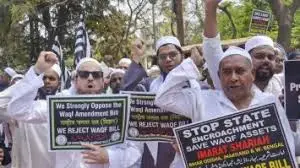Supreme Court reserves interim orders in Waqf case

The Supreme Court of India recently reserved its interim orders on a crucial legal challenge concerning the Waqf (Amendment) Act, 2025. This marks an important moment in the debate over the Act’s validity and its effects on managing Waqf properties across the country.
What Are Waqf Properties?
Waqf properties include assets dedicated by Muslims for religious or charitable use. These often include mosques, graveyards, and schools. The management of these properties usually falls to Waqf Boards, which state governments establish under the Central Waqf Act, 1995.
These properties hold great importance for the Muslim community. However, they have faced problems such as mismanagement and encroachments. These issues have led to demands for reform. The Waqf (Amendment) Act, 2025 came as a response to these challenges.
The Controversy Around the Waqf (Amendment) Act, 2025
The 2025 amendment introduced many changes to improve governance of Waqf properties. But it also sparked strong opposition. Petitioners challenged the Act in the Supreme Court, questioning its constitutionality and fearing it could cause illegal loss of Waqf assets.
They argue that the law lets the government interfere too much. The Act allows non-judicial processes that could threaten community rights. They also oppose changes in Waqf Board composition, which now includes non-Muslim members. The petitioners say this weakens the Boards’ religious identity.
On the other hand, the government defends the Act. It claims Waqf is a secular institution. The amendments, they say, help protect properties and improve management while following the Constitution.
Main Issues in the Supreme Court
The court focused on three major issues during the hearings:
- Denotification of Waqf Properties:
The government can now “denotify” properties that courts, users, or deeds declared as Waqf. Petitioners warn this could allow arbitrary removal of Waqf status. They fear this threatens community assets without proper safeguards. - Composition of Waqf Boards:
The amendment requires including non-Muslims in Waqf Boards. The government says this promotes transparency and secular governance. Critics argue this harms the Boards’ religious nature and could cause conflicts. - Inquiry into Government Land:
The Act outlines procedures for examining government lands declared as Waqf property. Petitioners fear misuse that could lead to losing legitimate Waqf holdings.
The bench, led by Chief Justice BR Gavai and Justice Augustine George Masih, heard senior advocates Kapil Sibal, Rajeev Dhavan, and Abhishek Singhvi for the petitioners. Solicitor General Tushar Mehta appeared for the Centre.
Importance of Interim Orders
The court’s decision to reserve interim orders shows its careful approach. Interim orders can provide temporary relief or maintain the current state while the court studies the final issues.
For the Muslim community, these orders could mean protection or worry about their Waqf properties. For the government, the orders could affect how the new rules are enforced in the short term.
Larger Legal and Social Impact
This case goes beyond legal technicalities. It touches on religion, property rights, and India’s secular framework. Its outcome could affect:
- Religious Autonomy vs. State Control:
How much should the state regulate religious institutions, especially when it claims to protect them from harm? - Minority Rights and Constitution:
The petitioners highlight Articles 25 and 26, which protect religious freedom and management. They fear the Act violates these rights. - Property Rights and Fair Process:
Denotification without strong judicial safeguards could violate the right to fair treatment. - Secularism and Representation:
Including non-Muslims in Waqf Boards raises questions about balancing secular governance with respect for religious identity.
Historical Context
Indian courts have long protected Waqf properties and stressed their special status under personal law. They also guard these assets from illegal use or takeover.
The 2025 amendment changes the governance model significantly. The Supreme Court will likely try to balance reform needs with constitutional freedoms.
What to Expect Next?
The court’s interim orders are awaited closely. After that, detailed hearings will continue. The final judgment will clarify government powers under the amended law and set a precedent for religious property management.
Experts expect the court to balance community rights with government duties carefully.
Conclusion
The Supreme Court’s move to reserve interim orders in the Waqf case highlights the complexity of the issue. The case deals with constitutional principles, religious freedom, and the fate of millions of community assets.
Its outcome will influence how India manages religious property rights, minority protections, and state oversight. The country hopes for a fair decision that respects tradition and upholds the rule of law.






